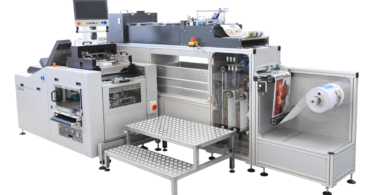The team placing third from Michigan Technological University created a hands-free and wearable solution that alerts the wearer of nearby obstacles and hazards.
Over one billion people worldwide suffer from vision loss and 300 million have severe vision impairment. At the moment, most aiding devices require the impaired to use their hands, and are unfortunately only alerted of objects within their immediate surroundings. However, the team from Michigan Technological University is seeking to change that with their submission for the SICK$10K Challenge.
The SICK$10K Challenge provides university students from across the country the chance to pair their drive for innovation with cutting-edge technology from SICK. Participating students in 2024 received a SICK multiScan100, a 3D LiDAR sensor that can detect objects both indoors and outdoors. Third place team members from Michigan Tech include Alex Beltz, Alexander Kwapisz, Zoey Mishler, Chase Pelletier, and Nathan Soule. They worked together to develop the Real-time Hazard Evaluation and Mitigation Instrument, or, RHEMI.
Why the SICK$10K Challenge and the RHEMI?

The team gave a lot of thought to both the challenge and the solution itself. “We explored many different problems, went through an in-depth analysis, and decided on RHEMI—not only because of how much it would benefit the wearer, but all those around them and the overall positive impact on general society,” explained Beltz. Team members agreed and added that the challenge allowed them independence when developing the RHEMI.
“Our main goal was to create something that could be usable for anyone, whether they have a visual impairment, auditory impairment, or if they have full use of their senses but are in an environment that is difficult to navigate. Basically, it’s to equip the wearer with a ‘sixth sense’ of their surroundings,” added Mishler.
“We also chose this idea because it allowed our electrical and computer engineers to take their own portions of the project. We picked the SICK$10K Challenge over other options for our senior design project because it allowed us to be really creative and propose our own solution,” said Soule. Additionally, during brainstorming, the team determined that LiDAR was needed to create their imagined invention, making the SICK$10K Challenge a stellar fit.
The brains of the RHEMI: the mutiScan100
The team explained their solution as a, “fully wearable [helmet] and hands-free device utilizing the multiScan100 in conjunction with [the team’s] developed software to enable the user to navigate their environment safely and confidently.” The RHEMI communicates information to the user through eight different pressure applicators located on the helmet.
The multiScan100 creates a cloud of the user’s environment, which is then relayed to the RHEMI. “The multiScan100 was basically the center of our project. With the LiDAR, the whole point is to take in the user’s surroundings and process that to then create something that the wearer can physically feel with the helmet,” said Nathan Soule.

Altering lives one innovation at a time
Not only did the team create a solution that could completely change the lives of others, but they were able to enhance their own skills as well.
“Working on something that was a new idea within a group really made us feel like real engineers,” mentioned Mishler.
Team member Soule agreed:
“In our college course work, we have labs where we do hands on work, but even in those circumstances we’re still following a preset procedure so we don’t do any real engineering, just learning. But in this project specifically, we had to push forward and create those procedures ourselves, obviously finding where troubles lie and then take steps back if needed. This challenge definitely felt like real engineering, and not just lab work.”
Nathan Soule

What’s next for the RHEMI?
The team members are all embarking on the next steps of their careers, but still brainstorming how to improve their solution.
“I think we can shrink the size and weight by around 90% to make it similar in size to a hardhat,” said Beltz.
Stay aware of your surroundings and keep an eye out for any updates regarding the RHEMI!





